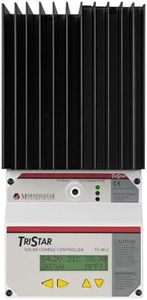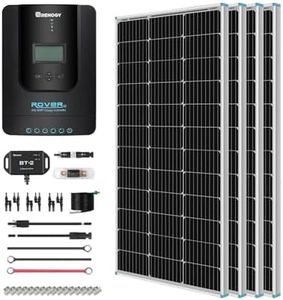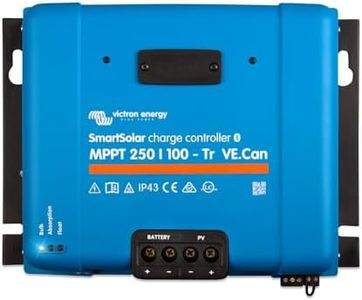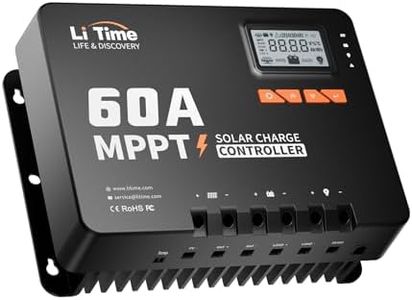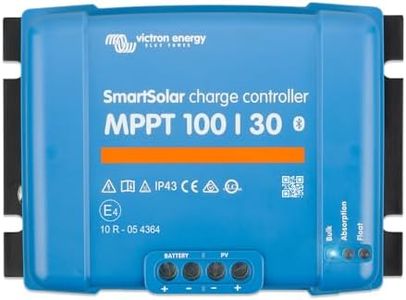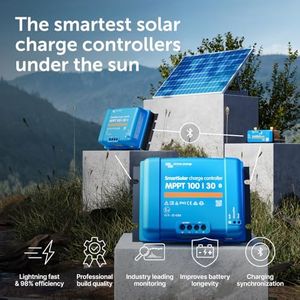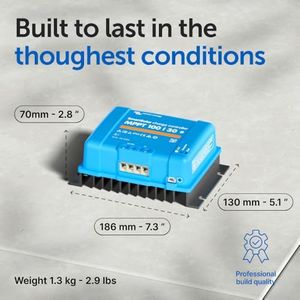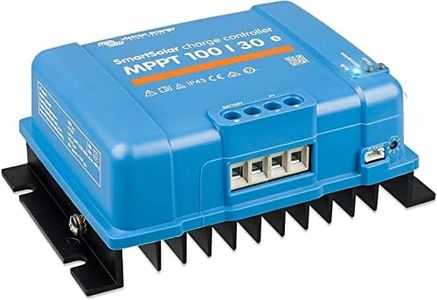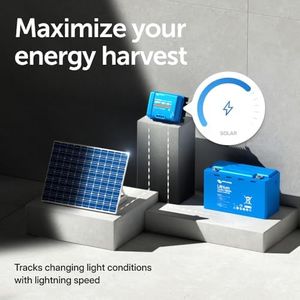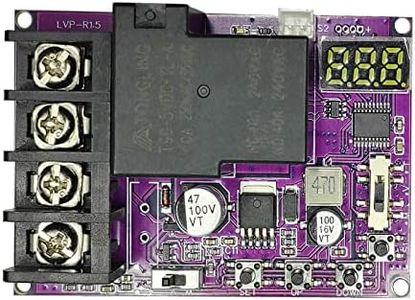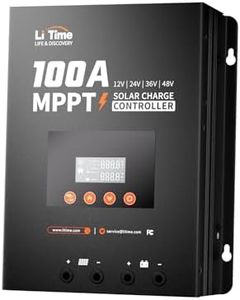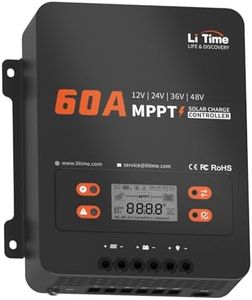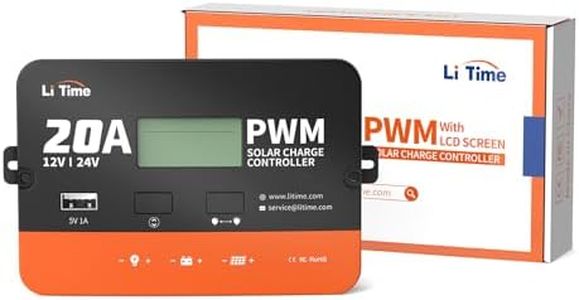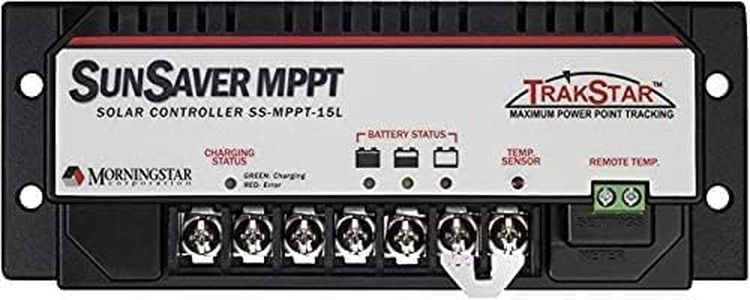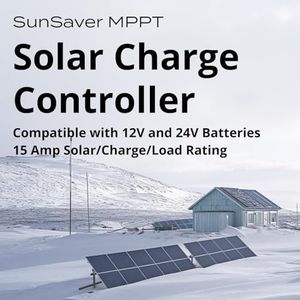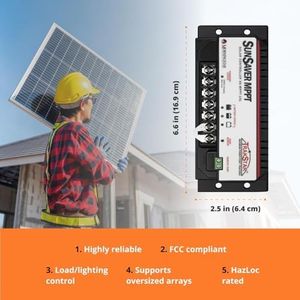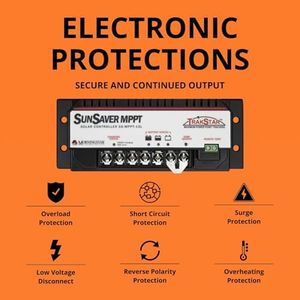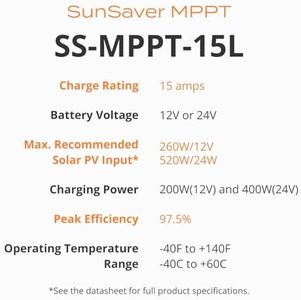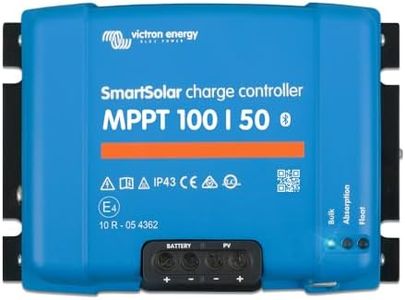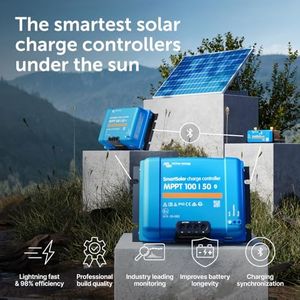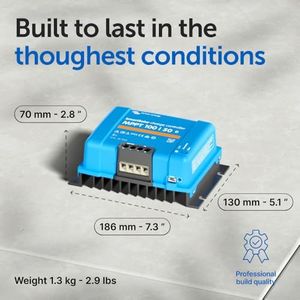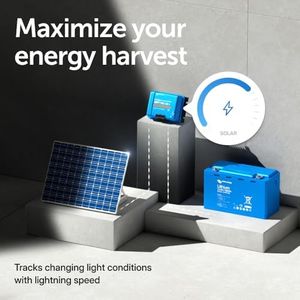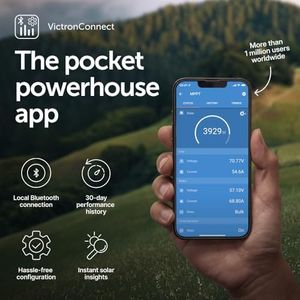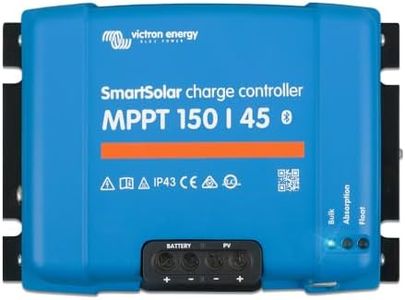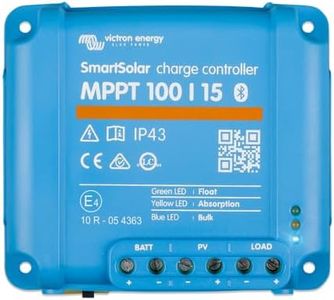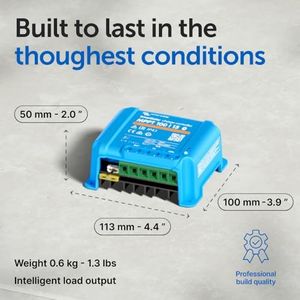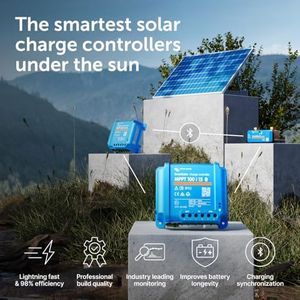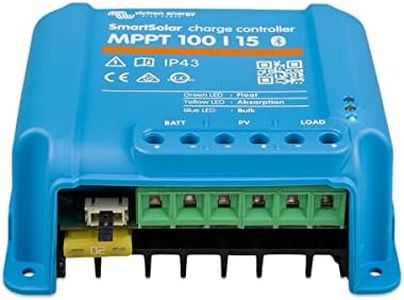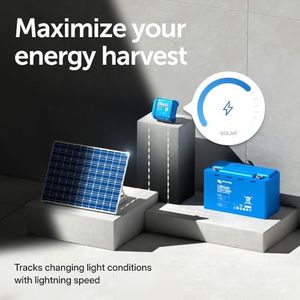10 Best Solar Controllers 2026 in the United States
Winner
Morningstar Tristar 60A MPPT Solar Charge Controller (TS-MPPT-60M) - Solar Panel Regulator w/ Meter for 12/24/36/48V LA/Li Batteries, 99% Efficiency, FCC Comp. Data/Comms, 5 Yr. WTY, Designed in USA
The Morningstar Tristar 60A MPPT Solar Charge Controller stands out as a robust choice for those managing larger solar systems with its high 60A current rating. This makes it well-suited for setups involving multiple panels or high-voltage outputs. Its compatibility with 12/24/36/48V batteries, including both lead-acid and lithium-ion types, adds significant flexibility, allowing users to tailor their energy systems effectively.
Most important from
310 reviews
Renogy 400 Watt 12 Volt Premium 4 Pcs 100W Panel+40A MPPT Charge Controller+ Bluetooth Module Fuse+ Mounting Z Brackets+Adaptor Kit +Tray Cables Set, 400W, Grid 12V Solar Power System
The Renogy 400 Watt 12 Volt Premium Solar Power System is a comprehensive kit designed for reliable energy generation and efficient power management. This system includes four 100W solar panels, a 40A MPPT charge controller, Bluetooth module, fuses, mounting brackets, and necessary cables. The MPPT charge controller is highly efficient, with 99% tracking efficiency and 98% peak conversion efficiency, making it superior to traditional PWM controllers. This ensures optimal battery charging, enhanced further by a temperature sensor that adjusts input voltage to prevent under-charging or overcharging.
Most important from
1920 reviews
Victron Energy SmartSolar MPPT Tr VE.Can Solar Charge Controller (Bluetooth) - Charge Controllers for Solar Panels -250V, 100 amp, 12/24/36/48-Volt
The Victron Energy SmartSolar MPPT TR VE.Can Solar Charge Controller is an advanced and efficient solution for converting sunlight into usable energy. It features an MPPT (Maximum Power Point Tracking) controller type, which ensures you get the maximum power output even under partial shade conditions. This charge controller is highly versatile, compatible with 12/24/36/48-Volt systems and capable of handling up to 100 amps, making it suitable for a wide range of solar applications.
Most important from
177 reviews
Top 10 Best Solar Controllers 2026 in the United States
Winner
Morningstar Tristar 60A MPPT Solar Charge Controller (TS-MPPT-60M) - Solar Panel Regulator w/ Meter for 12/24/36/48V LA/Li Batteries, 99% Efficiency, FCC Comp. Data/Comms, 5 Yr. WTY, Designed in USA
Morningstar Tristar 60A MPPT Solar Charge Controller (TS-MPPT-60M) - Solar Panel Regulator w/ Meter for 12/24/36/48V LA/Li Batteries, 99% Efficiency, FCC Comp. Data/Comms, 5 Yr. WTY, Designed in USA
Chosen by 1417 this week
Renogy 400 Watt 12 Volt Premium 4 Pcs 100W Panel+40A MPPT Charge Controller+ Bluetooth Module Fuse+ Mounting Z Brackets+Adaptor Kit +Tray Cables Set, 400W, Grid 12V Solar Power System
Renogy 400 Watt 12 Volt Premium 4 Pcs 100W Panel+40A MPPT Charge Controller+ Bluetooth Module Fuse+ Mounting Z Brackets+Adaptor Kit +Tray Cables Set, 400W, Grid 12V Solar Power System
Victron Energy SmartSolar MPPT Tr VE.Can Solar Charge Controller (Bluetooth) - Charge Controllers for Solar Panels -250V, 100 amp, 12/24/36/48-Volt
Victron Energy SmartSolar MPPT Tr VE.Can Solar Charge Controller (Bluetooth) - Charge Controllers for Solar Panels -250V, 100 amp, 12/24/36/48-Volt
Victron Energy SmartSolar MPPT Solar Charge Controller (Bluetooth) - Charge Controllers for Solar Panels - 100V, 30 amp, 12/24-Volt
Victron Energy SmartSolar MPPT Solar Charge Controller (Bluetooth) - Charge Controllers for Solar Panels - 100V, 30 amp, 12/24-Volt
Victron Energy SmartSolar MPPT Tr Solar Charge Controller (Bluetooth) - Charge Controllers for Solar Panels - 150V, 70 amp, 12/24/36/48-Volt
Victron Energy SmartSolar MPPT Tr Solar Charge Controller (Bluetooth) - Charge Controllers for Solar Panels - 150V, 70 amp, 12/24/36/48-Volt
Morningstar SunSaver 15A MPPT Solar Charge Controller SS-MPPT-15L - Solar Panel Regulator, Supports 12/24V LA/Li Batteries. Load/Lighting Ctrl, HazLoc Rated, Low Noise, 5 Yr. WTY - Designed in the USA
Morningstar SunSaver 15A MPPT Solar Charge Controller SS-MPPT-15L - Solar Panel Regulator, Supports 12/24V LA/Li Batteries. Load/Lighting Ctrl, HazLoc Rated, Low Noise, 5 Yr. WTY - Designed in the USA
Victron Energy SmartSolar MPPT Solar Charge Controller (Bluetooth) - Charge Controllers for Solar Panels - 100V, 50 amp, 12/24-Volt
Victron Energy SmartSolar MPPT Solar Charge Controller (Bluetooth) - Charge Controllers for Solar Panels - 100V, 50 amp, 12/24-Volt
Victron Energy SmartSolar MPPT Solar Charge Controller (Bluetooth) - Charge Controllers for Solar Panels - 150V, 45 amp, 12/24/36/48-Volt
Victron Energy SmartSolar MPPT Solar Charge Controller (Bluetooth) - Charge Controllers for Solar Panels - 150V, 45 amp, 12/24/36/48-Volt
OUTBACK POWER 80AH MPPT Controller
OUTBACK POWER 80AH MPPT Controller
Victron Energy SmartSolar MPPT Solar Charge Controller (Bluetooth) - Charge Controllers for Solar Panels - 100V, 15 amp, 12/24-Volt
Victron Energy SmartSolar MPPT Solar Charge Controller (Bluetooth) - Charge Controllers for Solar Panels - 100V, 15 amp, 12/24-Volt
Our technology thoroughly searches through the online shopping world, reviewing hundreds of sites. We then process and analyze this information, updating in real-time to bring you the latest top-rated products. This way, you always get the best and most current options available.

